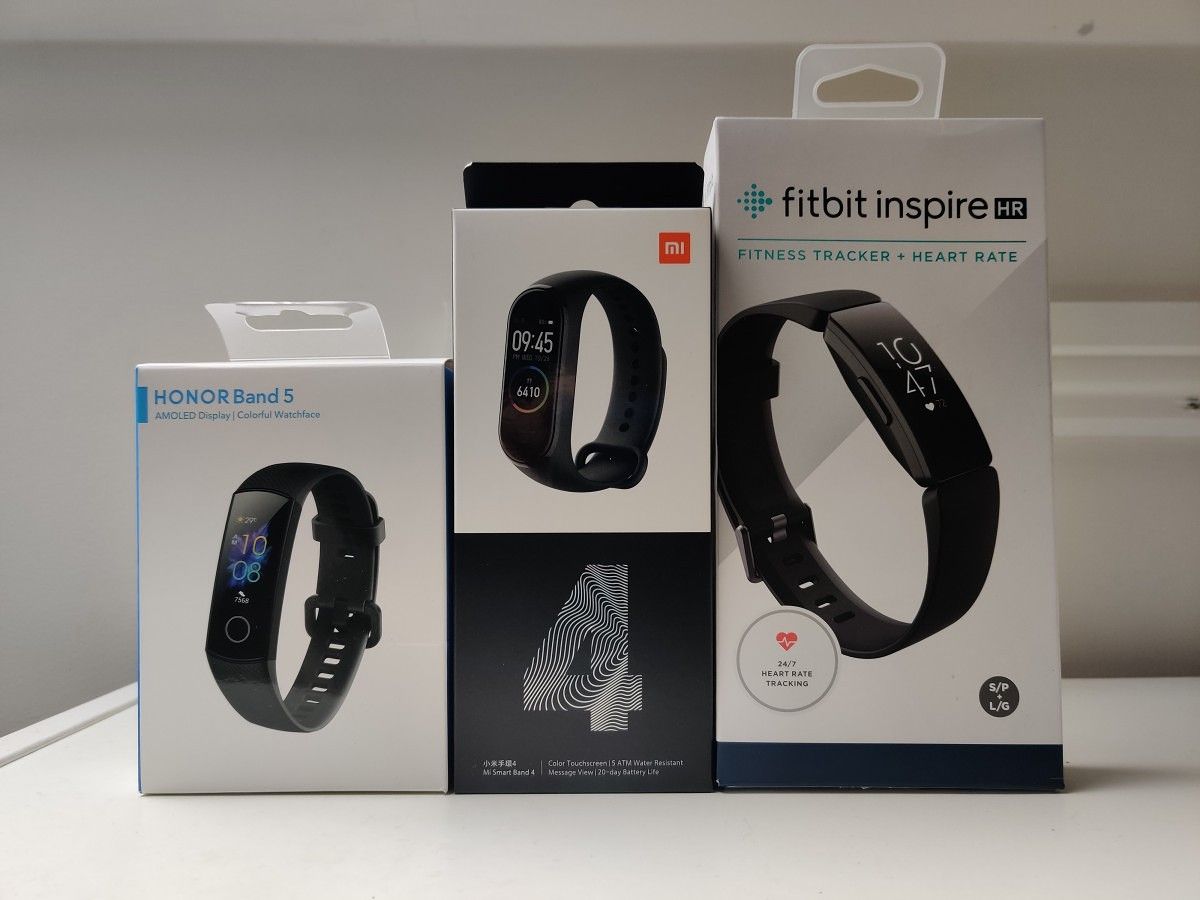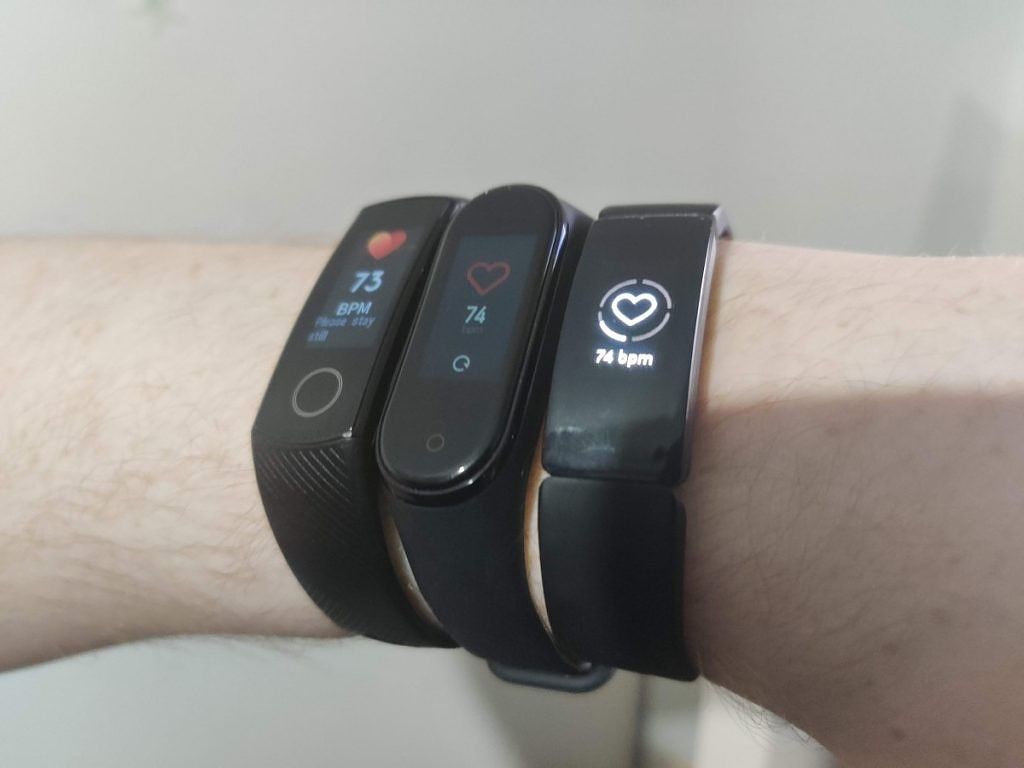When it comes to fitness trackers, there are very few consistent big names that we think of. Fitbit is probably the most well-known and respected, while others like Garmin and Samsung trail a little bit behind. Smartphone companies want a slice of the pie as well, as both Honor and Xiaomi have their own fitness bands as well. In this mini-review, we're going to compare the Honor Band 5, the Xiaomi Mi Band 4, and the Fitbit Inspire HR on metrics such as heart rate monitoring, sleep tracking, step counts, and their respective apps which control them.
Apps
Huawei Health
The Huawei Health app for use with the Honor Band 5 is probably the cleanest of all three apps. It's minimalistic but feature-packed, and really easy to get to what exactly you want to see. I prefer the layout of the Huawei Health app for the most part over the Mi Fit app, though I prefer the heart rate graph of the Mi Fit app over Honor's. It's no question that the way sleep tracking data is displayed is the best, though. Admittedly, sleep advice seems a little bit useless, as the data it gives is fairly obvious. Not only that, but the sleep "score" feels extremely arbitrary and doesn't feel like it has any actual worth. The Huawei Health app does a great job of covering a little bit of everything.
Mi Fit
While the Huawei Health app is the cleanest app for controlling your fitness band, the Mi Fit app is probably my favorite. It has lots of cool, useful information with interesting tidbits throughout. The sleep suggestions are a bit dumb here too, but I like the interesting information such as "you've saved 0.11L of gas". This is pretty practical information, and it's interesting to think about. I also prefer the heart rate graph here - it feels smooth and a lot less clunky than the Huawei Health app. It has a ton of features as well, just like the Huawei Health app, so you're not really missing out.
Fitbit
The Fitbit app is a strange one at first, but it quickly becomes evident why. While the Huawei Health app and the Mi Fit app both take into account their more tech-savvy user base, Fitbit understands that they appeal more to the general, wider market. It's simple, it's easy to use, and there are no bells and whistles. Settings are scarce as well, as to even enable a 24-hour clock on my watch face required me to log into the Fitbit web panel to change my profile settings. The Fitbit's appeal comes from its wide range of health-related features, not tech. Food tracking, water tracking, high-accuracy heart rate monitoring are all essential to someone focused solely on getting fit, something which the Honor Band and the Mi Band are just not for. I like how information is displayed, it's easy to understand and see what's important straight away.
Sleep tracking
Honor Band 5
The Honor Band's sleep tracking is pretty accurate - at least in how it identifies when you fell asleep and when you woke up. Enabling TruSleep allows it to monitor your sleep to greater detail overnight, at the expense of diminished battery life. The level of detail is unmatched by both the Fitbit and the Mi Band, though the information is, as I've mentioned, somewhat arbitrary. What's the point of a sleep "score"? I understand it also is designed to give me sleep suggestions, but it's not exactly identifying anything that I don't know. I probably should sleep earlier, just like it suggests to me every night. The more in-depth suggestions like mentioning bathing in essentials oils can help to calm you before sleeping may be practical to some, though, and those are more in-depth than what both Fitbit and Xiaomi offer.
Mi Band 4
The Mi Band 4 seems to be a small bit less accurate in sleep tracking, though not by much. It's generally within a few minutes of the Honor Band 5. For example, last night it said I was asleep about 15 minutes before the Honor Band said I was, and the Honor Band got my sleeping times correctly. The time it detected me as waking up was also wrong - it took my alarm's time, as opposed to the time I actually woke up at which was 5 minutes prior. They're small things, but from my (admittedly limited) testing, it would appear that the Honor Band is more accurate.
Fitbit Inspire HR
Left: Fitbit Inspire HR // Right: Honor Band 5
Readings were taken by both on the same night...
Whatever you may think about the results from the Honor Band 5 and the Mi Band 4, the Fitbit Inspire HR's sleep tracking is laughable. There's literally no semblance of accuracy from it at all. The other day, I had an 8-hour sleep which the Honor Band 5 measured correctly while the Fitbit registered 4 hours in the same time period. The Fitbit Inspire HR seems to have trouble getting a lock on my heart rate at night as well, which neither the Mi Band 4 nor the Honor Band 5 struggled with. This isn't an isolated incident either, it has been that bad consistently. The other night, it tracked 1 hour of sleep, only to correct the data to be 57 minutes of sleep. I had slept, roughly, 7 hours. Looking it up online seems to reveal that I'm not the only one who found issues with its sleeping tracking either. In short - don't get the Fitbit Inspire HR for sleep tracking. Just don't.
Heart-rate monitoring
This section isn't all too hard to write, as all three devices appear to be accurate to each other. All three devices are competent at heart rate tracking, and all three get more or less the same results in comparison to each other. I've been wearing both the Honor Band 5 and the Mi Band 4 for the last couple of days, and they're pretty much exactly the same at each interval of testing. Whichever one you get, I wouldn't worry - they seem to be just as accurate as each other, for the most part.
Odds and ends
Honor Band 5 - SpO2 reader and step counting
The Honor Band 5 has one feature that the others don't, despite its incredibly low price tag - and that's an SpO2 reader. Sadly, there's no way of telling its exact level of accuracy as we don't have anything to compare it to. It does seem to work as intended though, as after exercise my blood oxygen levels are measured consistently lower than when I'm just sitting down not doing anything.
However, on the step-counting front, I feel that the Honor Band 5 may have been overcounting my steps when compared to the Mi Band 4. I noticed on a few occasions that the steps had counted up on the Honor Band 5 when I had just been sitting down not doing anything, while the Mi Band 4 didn't count anything or counted significantly less. I found myself on each day of testing having a couple of hundred more steps on the Honor Band 5 as a result.
Mi Band 4 - All-round contender
The Xiaomi Mi Band 4 is pretty great at everything that it does. It may not have the bells and whistles of the Fitbit app or an SpO2 reader, but it has a solid feature set, fantastic battery life and comes with pretty much everything you could need out of the box. There's not much you can fault about the Mi Band 4, but that's because it's safe. There are no fancy or new features, it's just an iterative improvement over the Mi Band 3. The Mi Band 4 also allows you to buy different straps, which the Honor Band 5 doesn't allow.
Fitbit Inspire HR - Food tracking and more accurate calorie burn
One thing that got to me about the Mi Band 4 and the Honor Band 5's calorie-burning is that neither seems to really take pace into consideration when counting the calories burned. It seems that when you're not in an exercising mode, all steps are considered walking, even if you are walking fast or even running. I noticed that the Fitbit seemed to actively detect for pace, and would increase the calories burned as a result. One day I had 400 calories burned on the Fitbit Inspire HR from walking, while the Honor Band 5 only said around 200. I did some research and found that the Fitbit Inspire HR's calorie counting is considered extremely accurate, so I'd be mindful of that if fitness and exercise is your prerogative.
Conclusion
From the get-go, I always knew that this was going to be a difficult comparison to make. The Fitbit Inspire HR, while costing roughly three times the price of both of these fitness bands, is probably my recommendation if fitness is your focus. It's clearly not aimed at those who want an all-round integration with their smartphone, but I don't think anybody ever thought that Fitbit as a brand was aimed at technology fans like ourselves. If you're happy with more rudimentary tracking of exercise and want a more integrated experience with your smartphone, then you should look towards either the Honor Band 5 or the Mi Band 4.
Of those two, it's extremely hard to call which is better. I prefer the Mi Fit app over the Huawei Health app, and the Mi Band 4's battery life is incredible. Not only that, but the Honor Band 5 still suffers from lag when scrolling up and down occasionally, and the battery life is poor. Having said that, the sleep tracking on the Honor Band 5 appears to be more accurate, and the heart rate monitor with an SpO2 sensor gives it the edge of the Mi Band. If you want to take a more active part in your lifestyle and are trying to get healthy and fit on a budget, the Honor Band 5 is a great compromise. The heart rate sensor is accurate, the SpO2 sensor gives you a little bit more information than competitors offer and it's preloaded with lots of exercise modes as well.
However, if what you're after is a jack of all trades, master of none type deal, then you can't go wrong with the Mi Band 4 either. The main takeaway from this article that you should have is that both of these bands are great, and hopefully, this comparison has served to help you figure out which one is right for you.


